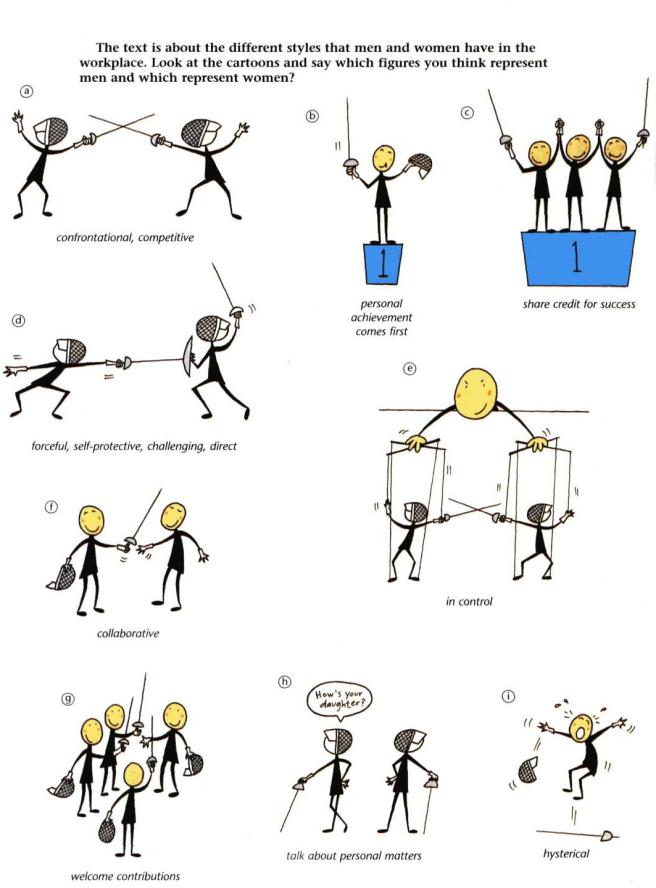
Учебник Английский язык
.pdf31
4. Match the word partnerships in groups 1 and 2, then check your answers in the article.
|
|
Group 1 |
|
|
|
Group 2 |
|
1 |
establish |
a) |
feedback |
1 |
present |
a) |
action |
2 |
monitor |
b) goals |
2 |
achieve |
b) |
employees |
|
3 |
provide |
c) |
decisions |
3 |
direct |
c) |
ideas |
4 |
set |
d) performance |
4 |
take |
d) |
performance |
|
5 |
make |
e) |
roles |
5 |
improve |
e) |
goals |
6 |
assign |
f) |
standards |
|
|
|
|
5. Check the following word partnerships. Find the odd one in each group.
1 |
check / assess / look |
performance |
2 |
make / achieve / establish |
goals |
3 |
reach / do / implement |
decisions |
4 |
meet / set / get |
standards |
5 |
establish / assign / make |
roles |
6 |
reach / deliver / achieve |
goals |
7 |
come up / make / present |
ideas |
8 |
achieve / direct / guide |
employees |
VOCABULARY THROUGH THE CONTEXT
Leadership
Can leadership be taught? Or are the only real leader born leader?
‘Traditionally, the model for leadership in business has been the army. Managers and army officers give orders and their subordinates (the people working bellow them) carry them out. Managers, like army officers, may be sent on leadership courses to develop their leadership skills, their ability to lead. But they still need a basic flair or talent for leadership.
What makes a great leader?
‘The greatest leaders have dynamism, an attractive quality that makes other people admire them and want to follow them.
A leader may be described as a visionary, someone with the power to see clearly how things are going to be in the future. People often say leader have drive, dynamism and energy.’
32
Modern management styles
How have management styles changed in the last few years?
‘Before, leaders were distant and remote, not easy to get to know or communicate with. Today, managers are more open and approachable: you can talk to them easily. There is more management by consensus, where decisions are not imposed from above in a top-down approach, but arrived at by asking employees to contribute in a process of consultation.
Do you think this trend will continue?
‘Yes. There are more women managers now, who are often more able to build consensus than traditional military-style authoritarian male managers.’
Empowerment
What, exactly, is empowerment?
‘Encouraging employees to use their own initiative, to take decisions on their own without asking managers first, is empowerment. Decision-making becomes more decentralized and less bureaucratic, less dependent on managers and system. This is often necessary where the number of management level is reduced.
To empower employees, managers need the ability to delegate, to give other people responsibility for work rather than doing it all themselves. Of course, with empowerment and delegation, the problem is keeping control of your operations: a key issue of modern management.’
1. Find the synonyms to make pairs.
subordinates |
strive |
entrust |
flair |
skills |
visionary |
distant |
goal |
objective |
organize |
dictate |
profit |
surplus |
accessible |
abilities |
remote |
empowerment |
intuition |
foreteller |
establish |
delegate |
impose |
try |
authority |
approachable |
employees |
|
|
2. Match the sentence beginnings with the correct endings.
1 We are looking for a new CEO, someone with strong leadership 2 Richard has real managerial flair
3 In the police, leader are held responsible
4 The study concludes that a charismatic visionary leader is absolutely not required for a visionary company
5 She is an extraordinary leader
6 Thatcher had drive, energy and vision,
7 He was a born leader. When everyone else was discussing

33
a but many thought it was the wrong vision.
b and, in fact, can be bad for a company’s long-term prospects. c and has won the respect of colleagues and employees.
d for the actions of their subordinates.
e skills and experience with financial institutions. f what to do, he knew exactly what to do.
g who will bring dynamism and energy to the job.

3. Complete the crossword with the correct forms of words, given in the vocabulary list.
Across
1,7 down What managers do, with or without talking to employees. 5 Adjective to describe leading without consultation.
8 Not easy to talk.
9 See 13 across
11 What the type of boss in 5 across does not do.
13, 9 Managers deciding without talking to employees is a ….. – down …… . 14 If managers ask employees to take on responsibility, they ….. .
15 If all the decisions are not made in a company’s head office, it is …… .
Down
2 To allow employees to decide things for themselves.
3 An organization where there are a lot of rules and procedures is …… . 4 If you decide without asking a manager, you use ……… .
6 The adjective relating to ‘consensus’.
7 See 1 across.
10 If decisions are not arrived at by consensus, they are …… . 12 Easy to see and talk to.
1 |
2 |
|
3 |
|
4 |
5 |
|
6 |
|
7 |
8 |
9 |
|
|
|
11 |
|

12
13 |
14 |
15
READING 2
1.Discuss the question in small groups.
Which would you prefer to work for?
a)a male boss
b)a female boss
c)either – you don’t have a preference?
2.Read the paragraphs of two articles. What is the main point made by the writer in each case?
a) Women are more efficient and trustworthy, have a better understanding of their workforce are more generous with their praise. In short they make the best managers, and if men are to keep up they will have to start learning from their female counterparts, a report claims today.
b) How do you like your boss? Sympathetic, empowering and not too busy, probably. They will be aware of the pressure of your job, but delegate responsibility where it’s appropriate. They will be interested in your career development. Oh, and, preferably, they
will be male.
3. Work in pairs. One of you reads article A. the other reads article B. Summarise each paragraph in a single sentence of no more than 15 words. Then give a summary of the whole article to your partner.
Article A
Who would you rather work for?
Women are more efficient and trustworthy, have a better understanding of their workforce are more generous with their praise. In short they make the best managers, and if men are to keep up they will have to start learning from their female counterparts, a report claims today.
The survey of 1,000 male and female middle and senior managers from across the UK is an indictment of the ability of men to function as leaders in the modern workplace.
A majority of those questioned believed women had a more modern outlook on their profession and were more open minded and considerate. By way of contrast, a similar number believe male managers are egocentric and more likely to steal credit for work done by others.
Management today magazine, which conduct the research, said that after years having to adopt a masculine identity and hide their emotions and natural behaviour in the workplace, women have become role models for managers.
The finding tally with a survey of female bosses carried out in the US. A five-year study of 2,500 managers from 450 firms found that many male bosses were rated by their staff of both sexes to be self-obsessed and autocratic. Women on the other hand leave men in the starting blocks when it comes to teamwork and communicating with staff.
In Britain more than 61% of those surveyed said men did not make better bosses than women. Female managers use time more effectively, with many of those surveyed commenting that juggling commitment is a familiar practice for women with a home and a family.
Female manages also appear to make good financial sense for pennypinching companies: most people, of either sex, would rather ask for a rise from a man.
‘If men want to be successful at work they must behave more like women,’ said the magazine’s editor, Rufus Olins. ‘Businesses need to wake up to the fact that so-called feminine skills are vital for attracting and keeping the right people. In the past women who aspired to management were encouraged to be more manly. It looks now as if the boot is on the other foot.’
Article B
Which bosses are the best?
How do you like your boss? Sympathetic, empowering and not too busy, probably. They will be aware of the pressure of your job, but delegate responsibility where it’s appropriate. They will be interested in your career development. Oh, and, preferably, they will be male.
One should not, of course, assume that all secretaries are female, but women still make up the overwhelming majority. So it makes uncomfortable reading for those who like to believe that a sort and cuddly sisterhood exists in the previously macho office environment, where women look out for their own. The findings also raise questions about neat predictions of a fiminised future for management, where ‘womanly‘ traits such as listening skills, flexibility and a more empathetic manner will become normal office currency.
Business psychologist John Nicholson is surprised by the survey’s findings, asserting that ‘the qualities valued today in a successful boss are feminine, not masculine’. He is emphatic that women make better bosses. ‘They listen more, are less status-conscious, conduct crisper meetings, are much more effective negotiators and display greater flexibility’.
They are also considerably more common than they used to be. According to information group Experian, women are no longer scarce in the boardroom – they occupy a third of the seats round the conference table. Women directors are still relatively uncommon in older age groups, but among young directors the proportion is growing.
Anecdotal evidence suggests that a reluctance to work for a woman may be more a question of management style than substance. ‘It’s just women bosses’ attitude,’ says Martha, a PA for 25 years who has worked predominantly for women, including a high-profile politician. ‘It’s something women have that men don’t. When they are critical they are much more personal, whereas men sail through not taking a blind bit of notice.’
Sonia Neill, a former secretary at Marks and Spenser, has experienced power struggles between women even where there was a significant disparity in status. ‘Women either find it awkward to give you work or they try to assert themselves by giving you really menial tasks. Men never do that.
4. Find words in the articles with the following meanings.
Article A |
Article B |
1 people with the same jobs as each |
6 aspects of a person’s character |
other |
|
2 a clear sign that a system isn’t |
7 absolutely convinced |
working |
|
3 thinking only about yourself |
8 based on stories about personal |
|
experience |
4 giving orders without asking others |
9 a difference between things |
for their opinions |
|
5 wanted to achieve an important goal |
10 behave in a determined way |
5.From the two texts, find as many characteristics as possible that are attributed to female managers.
6.Which ideas expressed in two articles do you agree with? Do you find any of these ideas surprising?

READING 3
2. Read the text and see if the writer’s ideas are the same with yours.
3. The text has eight subsections. Match the cartoons with the sections.
Men and women do things differently. There are, of course, exceptions to every generalization, including this one.
Cristina Stuart is a managing director of Speakeasy Training, a consultancy that runs courses for men and women working together. Here she describes a few key differences between the sexes in the workplace.
1 Working together
The male approach to business is competitive, direct and confrontational. The end justifies the means.* Personal status and a focus on the individual are important.
The female method is collaborative. Collective action and responsibility are more important than personal achievement. Lateral thinking*, as well as goodwill and the well-being of the individual, are also of great importance.
2 Tackling problems
The male approach is to go to the heart of the problem, without taking into account secondary considerations. The female preference is to look at various options.
3 Body language
Male body language tends to be challenging. Female body language tends towards self-protection. A stereotypical female pose is sitting cross-legged; the male sits with legs apart to give an impression that he is in control.
Male behaviour can include forceful gestures, for example banging a fist on the desk for effect. The female style does not usually include aggressive gestures.
4 Language
The male way of speaking does not encourage discussion. Women tend to welcome others opinions and contributions more.
5 Conversation
Men like to talk about their personal experiences and achievements or discuss ‘masculine’ topics such as cars or sport. Women tend to talk about staff problems and personal matters.
6 Meetings
If a woman does not copy the male confrontational style, she is often ignored.
7 Self-promotion
Men find it easy to tell others about their successes. Women tend to share or pass on the credit for a success.
8 Humour
Men’s humour can be cruel – a man’s joke usually has a victim. Female humour is less hurtful. A woman often jokes against herself.
